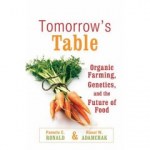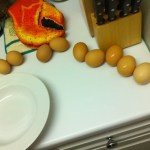food
Earlier this month, I was able to attend the final day of the Association for the Study of Peak Oil & Gas (ASPO) USA conference, and it reminded me how far behind we are in preparing for a future in which oil is less readily available than it is now.
Sharon Astyk, who's an ASPO board member, wrote a helpful Peak Oil 101 post that walks through the concept in some detail, but the basic issue is that there's a finite quantity of oil in the world, and at some point the rate of global oil extraction will slow. We may have already reached that point, or we may reach it in a decade or so. The…
Apparently, if Newt Gingrich is to be believed (and why would anyone do that?), he doesn't understand how food stamps stimulate the economy:
Well, you know, I carry around a bumper sticker that says 2 plus 2 equals 4. So I'd be very curious how a dollar given to somebody becomes a $1.79. And I think if we could get that to work with the U.S. Treasuries, so if people gave the Treasury $1,000, it became $1,790, we could pay off the federal debt and never worry about spending or anything. I mean, I -- you know, somehow, I don't understand how liberal math turns $1 into $1.79.
As I've mentioned…
The Washington Post's Jane Black gives us a heads-up about the forthcoming update to the Dietary Guidelines for Americans. Every five years, USDA's Center for Nutrition Policy and Promotion issues new dietary guidelines based on analysis by the Dietary Guidelines Advisory Committee, a group of scientific experts appointed by the Secretaries of HHS and USDA. Here's how the Dietary Guidelines for Americans 2005 publication explains the guidelines' role:
The intent of the Dietary Guidelines is to summarize and synthesize knowledge regarding individual nutrients and food components into…
The Washington Independent ran pictures taken by Joel Berg, the executive director of the New York City Coalition Against Hunger, showing what a week's worth of food stamps will buy you:
Remember this amount of food includes supplemental funding from the ARRA. Here's what one week looks like when you get rid off the supplemental funding:
Here's what will be lost:
First, I'm not seeing a whole lot of caviar or filet mignon here. Second, how the hell is a child supposed to learn on a diet like this? (I bet teachers unions are behind this somehow...).
Yesterday's walk in the woods near Drevinge garnered us the following:
Shaggy ink cap, Fjällig bläcksvamp, Coprinus comatus
Terracotta hedgehog, Rödgul taggsvamp, Hydnum rufescens
Shingled hedgehog, Fjällig taggsvamp, Sarcodon imbricatus
Common puffball, Vårtig röksvamp, Lycoperdon perlatum
Velvet bolete, Sandsopp, Suillus variegatus
Copper brittlegill, Tegelkremla, Russula decolorans
Birch bolete, Björksopp, Leccinum scabrum
I've never picked the ink caps before as I knew that the Common ink cap is poisonous at least in combination with alcohol. But now I know better. The shaggies…
There's a neat article in the Guardian today about designing new foods with genetic engineering and biotechnology.
Food, science, and design are intertwined from how we grow our food to how we eat it, from microwavable dinners to three-star molecular gastronomy at El Bulli. Designers like Oron Catts and James King who explore the possible future of synthetic biology and biotechnology present new ways of thinking about producing and shaping new foods like in vitro meat.
Although the work of designers such as Catts and King is speculative, it raises interesting questions about the future role…
Thanks to some informative comments on my post about figs and wikipedia my knowledge of botany is slowly improving and my admiration of figs steadily increasing. Many species of figs are pollinated by symbiotic wasps, but there are other fig varieties that develop edible, seedless figs through a process called parthenocarpy. A dominant mutation in the plant allows unfertilized flowers to stay on the tree and develop into yummy figs. While these seedless fruits are delicious, the plants that produce them are sterile, able to reproduce only through human intervention.
Fig trees are…
At my wife's suggestion, I quit work 1½ hour early today and cycled with her and the kids into the woods to pick mushrooms. Lovely sunny afternoon, and I can report that the hills between Lakes Lundsjön and Trehörningen are rich in boletes right now. Here are the species we got:
King bolete, Stensopp/Karl Johan, Boletus edulis
Velvet bolete, Sandsopp, Suillus variegatus
Orange Birch Bolete, Tegelsopp, Leccinum versepelle
Copper brittlegill, Tegelkremla, Russula decolorans
Chanterelle, Kantarell, Cantharellus cibarius
FÃ¥rticka, Albatrellus ovinus
[More about mushrooms; svamp.]
Remember the global food crisis of 2008? Disappointing wheat harvests in Europe, the US, and Australia led to a shortfall in global supplies, and poorer countries and consumers couldn't afford grain that had suddenly become much more expensive. In the US, families struggled to stretch their food budgets; in 14 other countries, food-related violence erupted.
Memories of that recent crisis have stirred as Russia (which suffered from drought this summer) has banned exports of its wheat and other countries have faced droughts or flooding. After the cost of bread jumped 30%, riots broke out in…
A delightful lunch conversation about fruits introduced me to what may be my new favorite symbiotic relationship! Figs are not actually fruits but a mass of inverted flowers and seeds that are pollinated by a species of tiny symbiotic wasps. The male fig flower is the only place where the female wasp can lay her eggs, at the bottom of a narrow opening in the fruit that she shimmies her way through. The baby wasps mature inside the fig into males that have sharp teeth but no wings and females ready to fly. They mate, the males chew through the special fig pollen holders and drop them down to…
There's a new medical study of the effects of alcohol consumption that finds a surprising result:
Controlling only for age and gender, compared to moderate drinkers, abstainers had a more than 2 times increased mortality risk, heavy drinkers had 70% increased risk, and light drinkers had 23% increased risk. A model controlling for former problem drinking status, existing health problems, and key sociodemographic and social-behavioral factors, as well as for age and gender, substantially reduced the mortality effect for abstainers compared to moderate drinkers. However, even after adjusting…
Bill Gates had a lot of thoughtful things to say about technology and social innovation at the recent Techonomy conference, including a nice plug for Tomorrow's Table!
"There's a lot of great thinking [from both the GMO and organic communities], which lead to things you should care about-preserving the environments and feeding people with a decent diet."
Video:
Reinventing Capitalism: How to jumpstart what the marketplace can't
Speaker: Bill Gates, Bill & Melinda Gates Foundation Interviewed by Brent Schlender
http://link.brightcove.com/services/player/bcpid87735931001?bclid=87675…
The…
Korea has a 5000 year history of food and farming. How much can a nine-year old and her mother learn on a two week visit to this land of miracles?
For the first few nights we stayed in a tiny room in a traditional Korean house called a "Hanok" house. There is a courtyard that everyone shares that the owners have filled with lots of stuff including a rabbit named Mimi. In this quiet place, one can imagine ancient times before the rebirth of this powerful nation that was almost totally destroyed by the Korean war (1950-1953). Now, although most cities are dominated by massive buildings and…
I'm pleased to see Grist exploring Urban Agriculture in the US in their "Feeding the City Series". America needs a focus on urban ag particularly because we have so deeply abandoned the ordinary and routine participations that city dwellers have always made to their foodshed. If you look at either our past or the present in most of the Global South and in many Global North Nations as well, we see that there's nothing very unusual in the urban dweller participating in food production. Indeed, most nations on the Global South produce at least 20% of their meat and produce within city limits…
And here's star philologist and religion scholar Ola Wikander with a guest lesson in Akkadian.
The word of the day is nuḫatimmu. It means "a cook" in Akkadian (or sometimes "a baker"). Maybe something to interest Gordon Ramsay? And wouldn't it be great if there was an Akkadian version of the TV show MasterChef, named Rab Nuḫatimmê? Taken literally, that term means "top cook", "best cook", but it was also used in a slightly different context way back when. In 586 BC, when Jerusalem had surrendered to Babylonian invaders, the victors sacked the city under the command of a certain…
I'm surprised that this revelation by Democratic Congressman David Obey hasn't received more attention. Basically, the House Democrats went to the wall for education and managed to get $10 billion to prevent teacher layoffs and an additional $5 billion for Pell Grants. To do so, they had to cut Obama's educational 'reform' program, Race to the Top, by about fifteen percent. This is the same so-called reform bill that screwed over Massachusetts' schools and that also weakened science education.
What was the Obama administration's response? According to Obey (italics mine):
The secretary…
Science is cooking done in a lab. Mixing carefully (or not so carefully) measured components, heating, cooling, observing phase transitions, exploring the behavior of animal and plant proteins, exploring the properties of different chemicals, slowly changing variables to optimizing procedures. Often, feeding bacteria has a lot in common with feeding people, and I have to admit that freshly autoclaved yeast media smells delicious.
Said another way, cooking is science where at least you can usually eat the failures. My fiancé and I have been failing at making soft-boiled eggs for quite some…
tags: Muppets' Swedish Chef makes Pöpcørn Shrimp!, humor, funny, silly, weird, Swedish Chef, cooking, food, The Muppets, streaming video
Do you like pöpcørn shrimp? Watch the Swedish Chef as he prepares this explosively good meal!
The Muppets have their own official website.
Liz Borkowski writes: Mark Pendergrast wrote yesterday about how politics plays into the work of the EIS, and it's something that I kept noticing as I read Inside the Outbreaks. As he points out, my post last week highlighted the solution to the Reye's Syndrome puzzle - which was solved by Karen Starko, who's also one of the Book Club bloggers! - but didn't get into the larger issue: there can be a big difference between solving the puzzle and solving the problem. In yesterday's post, Mark writes:
Although Karen's and subsequent CDC studies clearly demonstrated that giving children aspirin…




